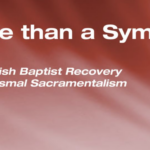In January 2021, I picked up the phone for my first call with the head of the search committee at Northminster Baptist Church (NBC). Thus began the process that ended with my appointment as NBC’s pastor in September 2021.
As expected, the church asked me many good questions throughout the process. They asked about my theological convictions, my preaching, my ecclesiology, my family background, my habits of prayer, my leadership style, and long-term goals. The candidating process is a time for the church to ask the prospective pastor many questions. But the questions shouldn’t travel in only one direction. The prospective pastor has questions to ask as well.
I am deeply thankful for the older pastors (father figures) who helped me during that time. But along with them, some of the best counsel came from guys close to my age (I was 32 at the time) who had recently gone through the process themselves. These older brother types helped me know what questions I needed to ask.
A few years removed from the process, I wanted to write something for young pastors beginning to candidate at churches. Think of it as advice from an older brother. What questions should you ask churches during this process?
Ask Theological Questions
Pastoral leadership is theological leadership. This is not the only burden of pastoral leadership, but it is a crucial one. Therefore, you want to learn about the theological culture of the church. If they have a statement of faith, a church covenant, or position papers on different issues, get familiar with them. But don’t assume you understand the theological culture just because you read the documents. Ask about how the statement of faith functions, how familiar the members are with it, and when it was last revisited.
If they ascribe to biblical inerrancy, how is the Bible used during worship services and preaching? Ask about how the congregation responds to preaching about God’s sovereignty, sin, and atonement. Knowing the climate of the place you visit informs what you need to pack. Getting a sense of the church’s theological climate helps discern whether you are equipped to lead, or if it’s best for someone else.
As a word of encouragement, I would say don’t run from disagreement. When I was candidating, I had substantial agreement with the leaders, but we also had some disagreements. If the leadership says, “This church doesn’t believe Jesus is God,” that’s a red flag. Disagreement on the nuances of predestination or the days of creation is not.
Ask Pastoral Questions
You want to know what kinds of programs and ministries the church runs, but also ask about weddings, funerals, hospital visits, counselling, and other on-the-ground shepherding responsibilities (stated in the job description or not).
For example, my church has many Nigerian families, so I learned about Nigerian baby naming ceremonies. It’s not in my job description, but it’s an important part of serving and shepherding the congregation.
Ask about their denominational and parachurch affiliations.
Ask about cases of church discipline. If they haven’t had any, ask about their process if it were to happen.
One person you should talk to is the previous pastor. Search committees are often well-meaning, mature Christians, but they don’t have the pastoral experience to speak to the nuances of pastoring their congregation. For good or bad, they are also trying to “sell” the church to candidates. Talking to the previous pastor can provide clarity about the on-the-ground realities of the church. Importantly, you can ask how the congregation treated his wife and kids.
For me, the most fruitful two hours of the process were the two hours on the phone with the pastor I was following. If he is still around, take him for coffee. If he is not, ask for his contact information and get in touch.
Ask Administrative Questions
One area I didn’t ask enough questions about was administration. I did not ask about the giving or the budget (insert facepalm emoji). I also didn’t ask enough questions about the condition of the building. We’ve had costly renovations in the last few years that I could’ve led us through better had I prepared for them.
Marriage counselors say money is one of the most common areas of conflict in marriage, and I think the same is true for churches. You also want to get an idea of the administrative load you’ll be expected to carry. Does the pastor print the song sheets and bulletins? What about overseeing committees? Who updates the directory? These questions help align your expectations with the real life of the church you are candidating for.
Ask Financial Questions
I hate talking about money. But it’s a must. I’m no financial expert, but even I know the cost of living has skyrocketed. Not asking about the finances because “the Lord will provide” is foolish. Yes, we walk by faith, but we also trust that God uses means to provide.
Don’t be a diva. Just be honest about your financial situation. I’m not saying you need to insist on a specific number. What I’m saying is that you need to have honest conversations with the search committee (or whoever is leading from the church’s side) about the salary package. Unspoken financial strain hurts the pastor, his family, and the church.
You Do Not Need All the Answers to Say Yes
As a final word of advice, expect surprises. You won’t have the complete picture of the church before you as you decide. You don’t need to.
Two verses were crucial for me during the search process: Acts 20:28 and Hebrews 11:8.
“Be on guard for yourselves and for all the flock of which the Holy Spirit has appointed you as overseers, to shepherd the church of God, which he purchased with his own blood.” (Acts 20:28)
“By faith Abraham, when he was called, obeyed and set out for a place that he was going to receive as an inheritance. He went out, even though he did not know where he was going.” (Hebrews 11:8)
Faith is not about having all the answers. Faith is about trusting the God who calls you to follow him. For pastors, the call to follow Jesus means stepping into leadership roles in the church.
I asked lots of questions during the search process. Still, my first year in pastoral ministry was full of surprises—strange ones, bad ones, and lots of good ones. You don’t need all the answers to have clarity. Any role you step into, take it as a step of faith.
























